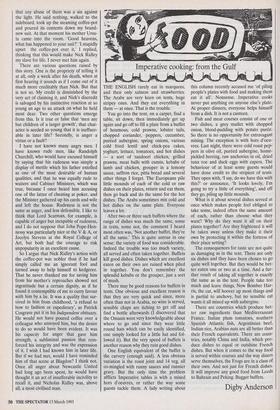Imperative cooking: from the Gulf
THE ENGLISH rarely eat in marquees, and then only salmon and strawberries. The Arabs are very keen on tents, huge stripey ones. And they eat everything in them — at once. That is the trouble.
You go into the tent, on a carpet, find a table, sit down, then immediately get up again and go off to fill a plate from a buffet of houmous, cold prawns, lobster tails, chopped coriander, peppers, cucumber, puréed aubergine, spring onions, various cold fried lentil and chick-pea cakes, yoghurt, lettuce, tomatoes, and hot dishes — a sort of tandoori chicken, grilled prawns, meat balls with cumin, kebabs of lamb and chicken, grouper in a lemony sauce, saffron rice, pitta bread and several other things I forget. The Europeans pile little mounds of each of the cold or raw dishes on their plates, return and eat them, then go back and do the same for the hot dishes. The Arabs sometimes mix cold and hot dishes on the same plate. Everyone leaves a lot, After two or three such buffets where the range of dishes was much the same, some in tents, some not, the comment I heard most often was, 'Not another buffet, they're all the same.' This is quite untrue in one sense: the variety of food was considerable. Indeed the trouble was too much variety, all served and often taken together. Buffets kill good dishes. Dishes which are excellent eaten on their own are ruined when piled in together. You don't remember the splendid kebabs or the grouper, just a sort of mush.
There may be good reasons for buffets in tents. One obvious and excellent reason is that they are very quick and since, more often than not in Arabia, no wine is served, sensible chaps are itching to get off and find a bottle afterwards (I discovered that the Omanis were very knowledgeable about where to go and since they wear little round hats which can be easily identified, one simply looked for a little hat and fol- lowed it). But the very speed of buffets is another reason why they ruin good dishes.
One English equivalent of the buffet is the carvery (enough said). A less obvious variation is the roast joint and 14 veg, all co-mingled with runny sauces and runnier gravy. But the only time the problem afflicts Imperative tables is with a mixed hors d'oeuvres, or rather the way some guests tackle them. A lady writing about this column recently accused me 'of piling people's plates with food and making them eat it all'. Nonsense. Imperative cooks never put anything on anyone else's plate. At proper dinners, everyone helps himself from a dish. It is not a canteen.
Fish and meat courses consist of one or two dishes, a grey mullet with chopped onion, blood-pudding with potato purée. So there is no opportunity for extravagant mixing. The exception is with hors d'oeu- vres. Last night, there were cold roast pep- pers in olive oil, puréed aubergine, home- pickled herring, raw anchovies in oil, dried tuna roe and duck eggs with capers. The behaviour of at least some guests would have done credit to the stripiest of tents. They open with, 'I say, do we have this with this?' or announce, 'It looks lovely, I'm going to try a little of everything', and off they go, piling up little mounds.
What is it about several dishes served at once which makes people feel obliged to take some, indeed often the same amount of each, rather than choose what they want? Why do they want it all on their plates together? Are they frightened it will be taken away unless they make it their own by protecting it within the fortress of their place setting?
The consequences for taste are not quite as damaging as in the tent. There are only six dishes and they have been chosen to go quite well together. But they would be bet- ter eaten one or two at a time. And a fur- ther result of taking all together is exactly the same as in the tent. People take too much and leave things. Now Bomber Har- ris, the cat, will hoover up most things and is partial to anchovy, but no sensible cat wants it all mixed up with aubergine.
There are countries which produce bet- ter raw ingredients than Mediterranean France. Italian plum tomatoes, southern Spanish Atlantic fish, Argentinian beef, Indian rice, Arabian nuts are all better than their French equivalents. There are coun- tries, notably China and India, which pro- duce dishes to equal or outshine French dishes. But when it comes to the way food is served within courses and the way diners serve themselves, the Frogs are in a class of their own. And not just for French dishes. It will improve any good food from Leeds to Bahrain and Peking. Bugger buffets.
Digby Anderson


























































 Previous page
Previous page